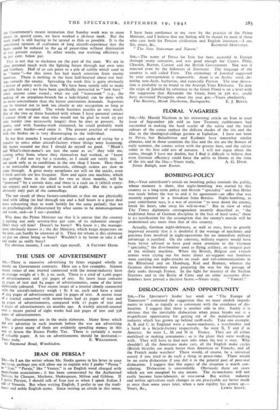DISLOCATION AND OPPORTUNITY
SIR,—The Spectator's leader last week on " The Europe of Tomorrow " contained the suggestion that we must abolish impedi- ments to trade as rapidly as is consonant with the avoidance of dis- location. I suggest that there is another side to this. Surely it is obvious that the inevitable dislocation when peace breaks out is a magnificent opportunity for getting rid of the maldistribution of industry which has grown up behind tariff-walls. Take one example. A, B and C in England were a motor-mechanic, a watchmaker and a hand in a bicycle-factory respectively. So were X, Y and Z in America. So were L, M and N in France. They are all either mobilised or making armaments ; so is the plant they were worfing with. They will have to find new jobs when the war is over. Why shouldn't all the Americans make cars, all the English make cycles (British bicycles are much better than American or French), and all the French make watches? There would, of course, be a universal outcry if you tried to do such a thing in peace-time. There would be no extra dislocation if you did it in the general post of post-war dislocation. I suggest that this aspect of the situation is worth con- sidering. Dislocation is unavoidable. Obviously there are cases which are not marginal by any means. The ex-mechanic will not easily become farm-labourer, or vice-versa. But within industry and within agriculture such changes as are practicable are better made at once than some years later, when a new rigidity has grown up.—


























 Previous page
Previous page